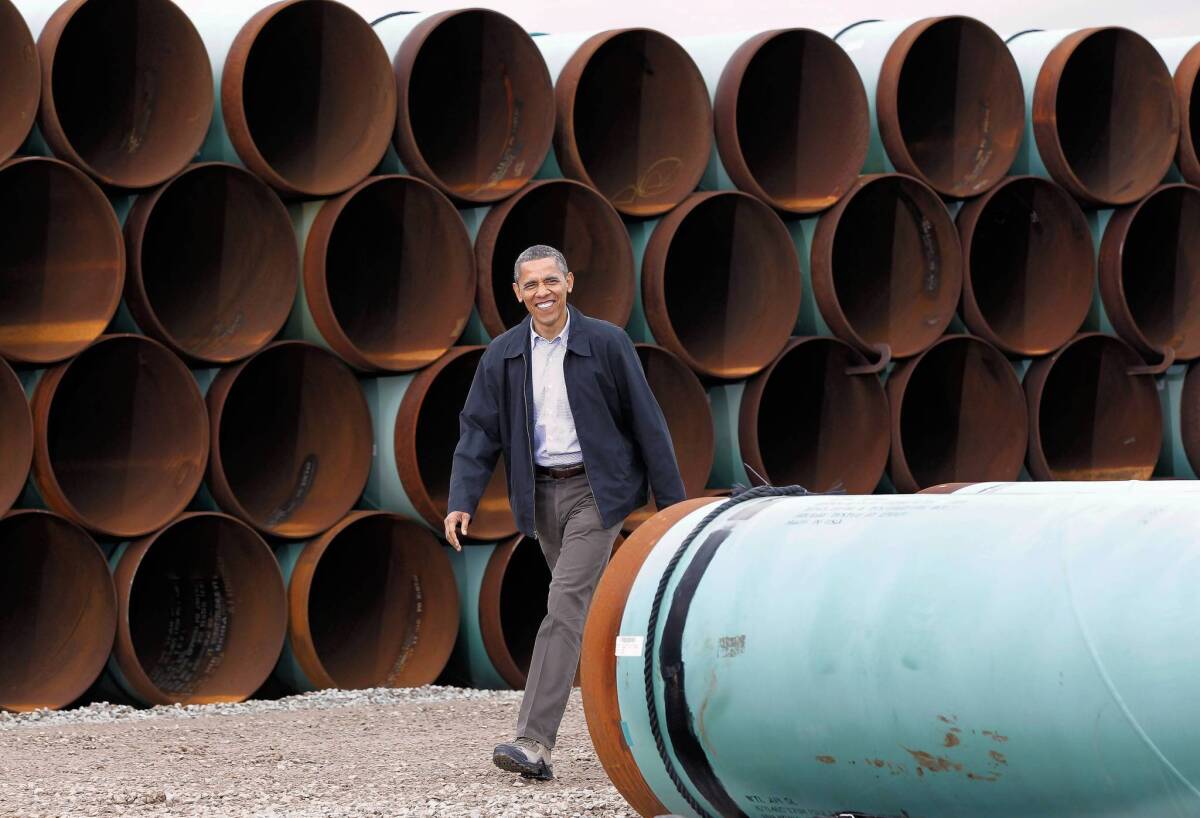Letters: Climate danger

- Share via
Re “Climate change won’t wait,” Opinion, Jan. 6
It is hard to understand President Obama’s stand on climate change. His Energy secretary, Nobel laureate Steven Chu, said four years ago that, if we don’t dramatically slow global warming, “we’re looking at a scenario where there’s no more agriculture in California.” He went on to question the viability of California cities.
Obama is not showing the type of resolve that Chu’s statement would seem to demand. Obama could get out front on climate change and tap George Shultz, Ronald Reagan’s secretary of State, and New York Mayor Michael Bloomberg, a couple of guys with pretty strong conservative business credentials, to lead the way on instituting a federal carbon tax.
Obama’s preference for subsidies, cap-and-trade and federal policing fall short of a carbon tax’s clear message. A carbon tax done right is foundational. Fossil fuel producers pay, the public receives the tax dividend, and carbon dioxide emissions begin to fall immediately.
Mark Tabbert
Newport Beach
Bill McKibben is very adamant that “if we’re to slow the pace of climate change we need to cut emissions globally at a sensational rate, by something like 5% a year.” Considering what a huge amount that is, it would be helpful for the professor to explain what the result would be if we somehow managed to do it.
How much would that slow the pace of climate change? Would it make a significant difference, or would it simply be destroying modern economies for the sake of doing something? What will be the result if we don’t do it?
McKibben must know the answers to be taken seriously.
P.J. Gendell
Beverly Hills
McKibben is right to take the Obama administration to task for its pathetic leadership on climate change. More intense floods, tornadoes and hurricanes are killing Americans today. Republicans may not like to compromise, but nature neither can nor will.
But while the Obama administration is surely culpable for failing to advocate, the Republican Party is guilty of making advocacy necessary. The Romney campaign’s padded internal polls made its leaders feel better, and they may have cost them the election. The same tendency to distort reality has been in overdrive on the topic of the climate for decades.
In this case, what is at stake is not just an election. It is our very lives, our fortunes and our sacred honor.
Daniel Richter
San Diego
With inaction in Washington, action by individuals to reduce their carbon footprint becomes more important.
A great way to reduce one’s greenhouse gas emissions is to drive less. Although walking and cycling in lieu of driving reduce emissions, they have limited appeal because of the region’s sprawl. Public transportation is a viable alternative.
But taking mass transit does not involve only walking to a bus stop or a train station and expecting a commute to just happen. It takes planning and familiarity with schedules and transfers. It takes time and determination to get a feel of how transit works, but it can be done.
Lawmakers must act now on climate change, but until they do, individual actions can go a long way toward slowing the effects of global warming.
Matthew Hetz
Los Angeles
ALSO:
Letters: A tool to stop Rx deaths
More to Read
A cure for the common opinion
Get thought-provoking perspectives with our weekly newsletter.
You may occasionally receive promotional content from the Los Angeles Times.










